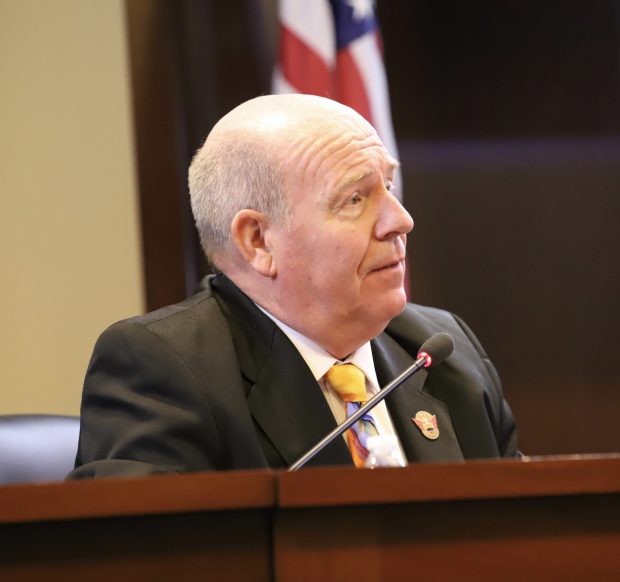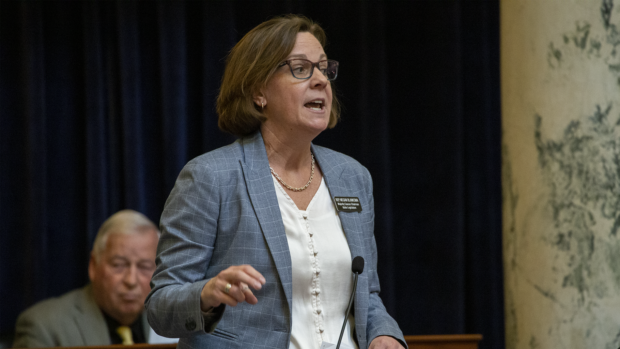The state would spend $2 billion on public school facilities over the next decade under a new bill from the governor’s office and House GOP leadership.
That would be a boon for many cash-strapped school districts but would come at the cost of their August election date, one of three remaining opportunities to seek voter approval for bonds and levies.

Gov. Brad Little teased the proposal — to help fix and replace “crumbling, leaking, falling apart” school buildings — during his State of the State address last month. On Thursday, House Speaker Mike Moyle, a co-sponsor, introduced the bill in the House Revenue and Taxation Committee.
The legislation is a goulash of tax and policy reforms headlined by about $150 million annually in new spending for facilities, along with individual and corporate income tax cuts.
Executive and legislative partners found a “path to do a really good thing for schools” and “provide some meaningful tax relief and accountability,” said Moyle, R-Star.
Under the bill, the state would secure a 10-year bond worth $1 billion, the proceeds of which would be divided among school districts. Districts could either take their share all at once or in increments over the life of the bond.
The money would be divided based on average daily attendance, a controversial funding formula based on how many students show up a few days out of the year.
“If we’re going to spend money for buildings, that money needs to go where those children are at,” Moyle said. “They need to be in those seats.”
To get that money, schools must make a few concessions, including giving up the August elections.
Previously, school districts had four opportunities to hold elections: in March, May, August and November. Last year’s House Bill 292, which gave schools about $106 million to pay off bonds and levies, nixed the March election but left the August date in play, for now.
Eligibility for the funding hinges on submitting a 10-year facilities plan and agreeing to a five-day school week, unless four-day schools meet minimum contract and instructional days that the State Board of Education will set later this year.
Eligible districts also must comply with the state’s anti-critical race theory law and agree that their job applicants won’t have to sign “written diversity statements.”
The bill also would sunset the state’s bond/levy equalization program, which primarily helps economically disadvantaged school districts offset the cost of bonds and levies. The $50 million in state lottery revenue that currently furnishes the program would be redirected to the school district facilities fund created by HB 292.
Little touted the plan as a $2 billion investment in school facilities over the next decade. The plan does call for that amount, but about $1.5 billion would be new spending. Here’s how the $200 million annually would break down:
- $125 million in sales tax revenue leveraged for a school district facilities bond.
- $50 million in lottery revenue redirected to the school district facilities fund.
- $25 million in sales tax revenue added to the school district facilities fund.
An additional provision of the bill would give the governor more direct authority over State Board leadership. The governor currently appoints State Board members — pending approval from the Senate — and the board elects a president from the panel and appoints a director to lead the office of the State Board. The new bill would transfer that authority to the governor.
The State Board’s current president is Linda Clark and current director is Matt Freeman.
Rep. Ned Burns, D-Bellevue, asked Moyle to justify the change that would allow the governor to appoint both positions. Moyle responded that it’s “an accountability issue.”
The State Board would be the agency managing the facilities bond under the bill. The legislation also would direct the State Board to issue annual reports on how the funds are used and it would create a “model school facility council” chaired by the State Board’s director.
The bill appears to have the support it needs to clear the House. The governor’s office Thursday released a list of Republican House co-sponsors — the exact number needed for a House majority.
There are just four Senate co-sponsors. Senate President Pro Tem Chuck Winder, R-Boise, told Idaho Education News that most senators haven’t yet seen the bill. But he’s considering becoming a co-sponsor, as well, once he has a closer look.
Budget battle results in rare House leadership ouster
The Legislature’s budget drama triggered a dramatic shakeup in House GOP leadership Thursday, and a relatively low-key vote on the Senate floor.
In the second of two closed-door caucuses, House Republicans booted Majority Leader Megan Blanksma, R-Hammett. On Wednesday, Blanksma was the sole member of House GOP leadership to vote against a spending bill for the courts system — an early test of a new approach to passing state budgets. That budget narrowly passed, in a 38-31 vote that deeply divided House Republicans and constituted a public challenge to House Speaker Mike Moyle, R-Star, a supporter of the new budget process.

The House floor fireworks began late Thursday morning, after the Republicans’ first closed caucus. The House cast a vote whether to retain Moyle as House speaker. That motion passed on a 69-0 vote, with Republicans and Democrats in support.
Then came the second caucus — and ultimately, the vote to remove Blanksma from leadership.
After the House adjourned for the day Thursday, Moyle attributed the floor tension to disagreements over the budget process. But he was guarded in his remarks.
“The leadership team, we’re doing fine,” Moyle told reporters. “We’re working through that as a caucus. We’ll see how that turns out.”
When directly asked about changes to the leadership team, Moyle deferred to House GOP Caucus Chairman Dustin Manwaring, R-Pocatello, who was standing nearby.
Later that day, Manwaring issued a news release saying that Blanksma had been voted out of leadership. House Republicans voted to retain Manwaring and House Asssistant Majority Leader Sage Dixon, R-Ponderay.
House Republicans are expected to choose a new majority leader in a vote Monday.
Leadership changes are uncommon in the Legislature, but not unheard of. In 2012, House Republicans selected Scott Bedke as speaker, replacing Lawerence Denney — but that vote occurred during the House’s biennial organizational session. Ousting a legislative leader in the middle of a session is more rare.
While the House’s business took place in a closed fourth-floor conference room, the Senate began working through budgets, approving $514.4 million for the prison system and Idaho State Police. Like the court system budget the House approved Wednesday, the public safety spending plan was billed as a “maintenance” budget, funding current-year operations.
Legislative leaders have said they will consider new spending items for state agencies — and budget line items — in subsequent bills.
During brief debate, Senate Democrats voiced skepticism. They said the Legislature could simply pass the “maintenance” budgets and nothing more. “I don’t want to stop here,” said Sen. Rick Just, D-Boise, a member of the Joint Finance-Appropriations Committee.
The public safety budget passed on a 28-7 party-line vote.
All told, the Legislature is poised to vote on 10 “maintenance” budget bills, which must pass both houses. Separate bills for K-12 and higher education are awaiting a House vote, which could happen as early as Friday.

IRI exemption bill heads to the House
A bill that could exempt some English language learners from the state’s reading test is headed to the House floor.
The exemption would cover up to 1,400 kindergarten through third-grade students — students who have spent less than two years in a school in the United States, and who score low on the state’s English language proficiency test. These students could get an exemption from the Idaho Reading Indicator, a screening test to measure early literacy skills.
“I feel like this is a reasonable accommodation that we can do for Idaho students,” said Rep. Soñia Galaviz, D-Boise, an elementary school teacher who is sponsoring the bill.
The exemptions would reduce student stress, since English language learners aren’t prepared to take the IRI, she said. Meanwhile, teachers and schools would get more accurate data from the test, eliminating “false negatives” from ELL students.
The House Education Committee endorsed House Bill 451 on a unanimous vote. A House vote could come in the next few days.
‘Parents-as-teacher’ bill unveiled
The Senate Education Committee gave initial signoff to a bill that embraces the “parents-as-teacher” learning model.
The model isn’t new. School districts can already work with parents of kindergartners through eighth-graders, which allows parents to play a primary role in educating their kids at home.
“One of the main goals of this bill is to avoid creeping regulation that may stifle innovation,” reads the statement of purpose for the bill, sponsored by Sen. Ben Adams, R-Nampa.
The committee voted unanimously to print the bill, but not before Sen. Janie Ward-Engelking, D-Boise, raised several questions about funding, curriculum, and whether the program allows a religious component in instruction. The bill could come back to committee for a full hearing at a later date.
